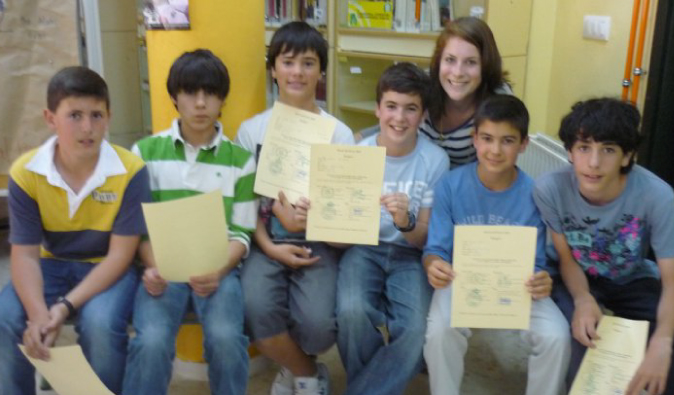HOW TO TEACH ENGLISH AND LIVE IN SPAIN

There are many ways to live and work overseas, from volunteering to working on a yacht, in a hostel, to being an au pair or teaching English, which is one of the most common ways people find work overseas (at least for native English speakers).
Today, I want to share Cat’s story, that of a 30-year-old American who fell in love with Spain while studying abroad, began to work, fell in love with a Spaniard, and now runs her own company there. It’s easy to go teach in Asia, but teaching in Europe is a little harder so I wanted to ask her how she did it and what advice she has for others.
Nomadic Matt: Tell everyone about yourself.
Cat: My name is Cat Gaa, and I’m a recently-turned-30 lover of historical fiction, train rides, midday siestas, and all-beef hot dogs. I’m originally from Chicago by way of Michigan and Iowa but have called sultry Seville, Spain, my home since graduating with a journalism degree in 2007.
How did you get into teaching?
Spanish was my star subject in high school, so my mom was eager to send me abroad during college. She’d spent a semester in Rome in the ’70s and made me promise to go abroad for at least a summer to improve my language skills.
Those six weeks studying in Valladolid had me craving a life in Europe after graduating. After looking into work exchange programs in the UK and weighing a radio job offer in Chicago, I couldn’t stop thinking about Spain. The study-abroad office at my university steered me toward a bilateral assistant teaching program between the U.S. and the Spanish Ministry of Education, and I swore that I’d take a position if offered.
Five days before my college graduation, I was accepted to teach English in a schoolsomewhere in Andalucía. Even coming from a family of teachers, I was apprehensive but excited.
One year stretched into two, and I’m now starting my ninth year as a TEFL professional.

Tell us about your work experience.
I spent the first three years as an auxiliar de conversación, or an English language asisstant, at a high school in rural Andalucía. I was provided with a student visa, stipend, and insurance, which I could renew for up to three terms. I realized quickly that teaching fit my outgoing and creative personality, so I decided to try to stay in Spain for a fourth year, since I had a boyfriend at the time and wanted to see where the relationship would go (spoiler: we got married in August 2015!).
Faced with unemployment, I sent my CV to every school and language academy in Seville and the surrounding towns. I had the experience, but not all of the qualifications and no work permit. Thankfully, a private bilingual school was desperate and hired me after an extensive interview (three hours, plus two teaching trials!). I spent two terms working as a first grade classroom teacher. I was largely underqualified, having never designed curriculum or dealt with major discipline issues, but I learned a lot.
Unfortunately, the pay and treatment at the private school were horrific, so I began to look into working for an after-school language program. A friend touted her academy for its organization and holistic approach to teaching — something I’d been missing in my previous job — and the hours were far less. I taught full-time at the academy while completing a master’s program and maintaining my personal blog, then was offered the Director of Studies position after four months. The 2015-16 term will be my third as the academic director of the school.
Is it easy to find work in Spain? What skills or degrees do you need?
As someone who has work permission, a teaching certificate, and years of experience, I haven’t had any problems finding gainful employment as a teacher. However, because I don’t have a teaching degree that’s been validated in the EU, I cannot teach at a public or semiprivate school without going back to school.
If you’re new to teaching or lack the proper credentials, it can be more difficult. An easy way to get your feet wet is to come on a teaching program and begin earning years toward Spanish residency, or to do a TEFL or CELTA course.
Because of the global financial crisis, many are upping their skill set by taking English courses. This means that English language academies are popping up all over the place, though many are run by people who don’t speak the language or are not teachers themselves. This has created a language bubble, and it’s affected the sector negatively. Schools that don’t require experience or certification are likely less than professional, and you run the risk of being taken advantage of.

Normally, EU countries tend to look for other EU citizens first. As an American, did you find that to be true, or is there enough demand where they look outside the EU for teachers?
It’s true that many schools don’t want to risk hiring someone without papers — fines can be up to €30,000! — and would rather hire a European because of this. But, native-speaker teachers are a must for parents in Spain, so if you have experience, you have a shot of being hired under the table for cash.
Obtaining work permission in Spain from a school is difficult, because by law the employer must post the position in a public forum, called the bolsa de empleo, for three weeks to prove you’re the most qualified for that position. Once the three weeks are up, the most likely scenario is that you’ll have to return to your home country for 3-4 months to process the visa.

What is life like in Spain?
Phenomenal. Fun. Vibrant. Challenging. What stands out to me the most is how regular my life feels in Spain now that I’m established, fluent in español, and have a job. I know how to do more adult things in Spain than in the United States because I’ve lived my grown-up life in Seville! The biggest difference is that I do it all in Spanish.
I have I-hate-Spain days more often than you’d imagine (mostly due to long lines, bureaucracy, and the haughty attitude of sevillanos), but the quality of life here is far better than in the US. I relish in riding my bike to work and buying cheap produce, as well as the local culture and the accessibility of travel.
My first few months in Spain were extremely shaky, though. I was struggling with the language, and my confidence disappeared. I could barely work up enough courage to call and order a pizza, let alone open a bank account or apply for my residency card. I also had no one to vent to about my feelings and often felt alone. Calls home did nothing to make me feel better, though I never once considered going home.
I don’t feel homesick any more. Spanish cities have become increasingly international, so when I need an English fix, I can call up a friend for coffee, see a flick in its original version, and even buy ingredients for a peanut butter and jelly sandwich. My advice is to be open to an immersion experience that also includes speakers of your own language. Look for groups like Internations or informal language exchanges, called intercambios.

What advice do you have for teachers looking to find work?
Coming to Spain to find work without a visa or on a teaching program is a solution for many, but long-term it can hurt your chances for residency. There are many ways to legally come to Spain, so do your research!
Once you have an avenue, get the certification. A CELTA is more highly regarded than a TEFL degree because it’s more rigorous, but personality counts for me, as well. I am responsible for hiring teachers for my language school, so experience and adaptability are important. Madrid and smaller villages with fewer English speakers have more opportunities for teachers.
After snagging a job, remember that there’s a three-month test period, so don’t rest on your laurels! Be sure to understand your contract with regard to salary, vacation time, and unemployment so that there aren’t any problems with your employer.
How does one get a job teaching if you aren’t in Spain? How can you find schools? What do you look for? Really walk us through the nitty-gritty! List any resources that are good too!
Open season for English teaching jobs is always on, but most schools will do the majority of their hiring from April to June and September to early October. There is often a need for another teacher to take on hours at other times of the year, namely January.
Most schools will ask for a CV, a cover letter, a recent photo of you and two references. Once you have everything prepared, you can send out blind applications to see who will bite. If you’re still home, also add a projected date for when you’ll be in Spain.
Don’t expect an email back if you’re not selected for an interview. If you haven’t heard from a school, politely follow up to request an interview. Talk up any experience you have; if you haven’t taught before, express your eagerness to learn and your flexibility — these are two attributes I look for in new teachers.
You can find schools through Google most easily, as well as recommendations on sites likeTefl.com, Expatcafe, and Facebook groups. Look for schools with a well-developed website and a strong reputation (newer schools tend to pay lower salaries and are more disorganized).

What scams or issues should teachers look out for?
Scams are generally not a problem in schools in Spain, though if you have the right to work legally, make sure to read your contract carefully. In fact, make sure you have a contract in the first place, and one that covers your health insurance and your vacation.
Spanish companies reserve the right to fire you within 90 days of your contract start date if they deem you unfit for the job, offering no reason and no severance package. If you make it to the end of your contract, though, you will receive a bonus called a finiquito. This should also include any vacation days that have not been taken.
Never pay for a position unless it’s with a reputable company (such as CIEE Teach in Spain) or a TEFL institute! I’ve heard of companies that recruit people under the pretense that they must pay part of their salary back to the head hunter. Given the number of jobs available, it’s best to steer clear of those.
I’d also add to be assertive with your employer. I hear of many unhappy teachers whose employers ask them to take on more hours outside their contract to satisfy customers. If you feel uncomfortable, remember that your employer needs you more than you need them (and I say this as someone who operates a language school!).
Why do you think teaching is a good option for people looking to live in Spain?
Not everyone who has come to Spain to teach has liked their job, but consider this: you have a job working with young people with an awesome schedule and ample days off. Your students will take to you, no matter what. You can live in a country that’s beautiful, inexpensive for Western Europe, and full of things to see and do on your long weekends.
While working as a teacher in Spain likely won’t cushion your bank account, the country is more familiar than, say, Southeast Asia, and it’s almost like a soft landing. I consider Spain a great place for TEFL teachers to get their feet wet before moving elsewhere. This is a growing sector and there are a lot of opportunities for employment.

For someone looking to live and work in Spain (in general, not specific to teaching), what are three pieces of advice you would give them?
In working with people interested in moving to Spain for a number of reasons, I’ve noticed that many seem to think that they can just show up and figure things out once they’re on the ground. While this is a viable option for some, it limits your movement around Europe and can hinder your visa options in the future. Research the many sorts of visas for Spain at your nearest consulate’s website, and you’ll be surprised that you likely qualify for many.
That brings me to the point of coming legally. While there are ways to come illegally, find work, and eventually get residency, the rules are strict, and without a legal contract, you aren’t qualified for public healthcare or unemployment, nor are you able to earn days toward your pension and retirement. If it’s a risk you’re willing to take, then go for it — just know that the foreigner’s office can disqualify you for certain types of visas that way.

Finally, remember that Spain is different. I find that those who come and leave quickly are the ones who complain that nothing is like their home country. I have a long list of annoyances in Spain, but if you can get past the weird banking hours, the long lines everywhere, and the late nights, you’ll find that Spain can be a fun place to live and work.
Cat Gaa blogs about life in Seville, Spain, and all that goes along with it at her blog Sunshines and Siestas — find her there to follow her journey teaching and living in Seville.
And, if you are interested in becoming a teacher, be sure to check out my book, How to Teach English Overseas, which lays out how to become an English teacher, how to apply for jobs, breaks down country by country information, and also features interviews with other teachers and job recruiters! You don’t need to be stressed or overwhelmed about this process. This book shows you getting a teaching job is easier than you think!
Be the Next Success Story
One of my favorite parts about this job is hearing people’s travel stories. They inspire me, but more importantly, they also inspire you. I travel a certain way, but there are many ways to fund your trips and travel the world, and I hope these stories show you that there is more than one way to travel and that it is within your grasp to reach your travel goals. Here are more examples of people who found work overseas to fund their trips:
Source: http://www.nomadicmatt.com/travel-blogs/teach-english-in-spain/
